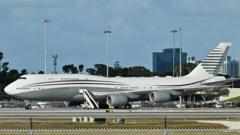The Qatar-gifted plane, valued at $400 million, faces scrutiny regarding the Emoluments Clause and potential espionage risks.
US Receives Controversial Boeing 747 Gift from Qatar for Air Force One Fleet

US Receives Controversial Boeing 747 Gift from Qatar for Air Force One Fleet
Critics and supporters alike express concerns over legality and implications of the gift.
The United States has officially accepted a Boeing 747 from Qatar, designating it for the Air Force One fleet, a move that has ignited intense debate. The Chief Pentagon spokesman, Sean Parnell, confirmed the acceptance of the aircraft, a generous gift from the Qatari royal family estimated to be worth $400 million. While the White House maintains the legality of the transfer, citing compliance with federal regulations, the announcement stirred controversy, raising questions among even prominent supporters of President Trump.
The newly acquired plane is slated for modifications to meet the rigorous security standards necessary for presidential travel, including protection against nuclear threats and mid-flight refueling capabilities. Experts, such as Mark Cancian from the Center for Strategic and International Studies, project that the retrofitting could potentially cost upwards of $1 billion.
Trump himself justified the acquisition by arguing that rejecting such a gift would be unwise, framing it as simply "a gift" from a trusted ally. However, the deal has been called into question due to the Emoluments Clause of the U.S. Constitution, which prohibits public officials from receiving gifts from foreign governments without congressional approval. The administration asserts that since the plane is being given to the Department of Defense rather than to Trump personally, it remains within legal boundaries.
Compounding the controversy, Trump has been critical of Boeing, contracted to supply two 747-8 aircraft for the White House, following delays in delivery. He visited the Qatari plane in Palm Beach shortly after assuming his second term, stirring further scrutiny over potential impropriety.
Despite assurances from both sides that the transaction is a straightforward government-to-government exchange devoid of personal motivations, concerns about foreign influence linger. High-profile Republicans such as Senators Rand Paul and Ted Cruz have openly criticized the deal, cautioning against potential risks to national security and the appearance of compromised judgments regarding Qatar's human rights record.
With the current Air Force One fleet consisting primarily of aging 747-200 jets, the acceptance of the Qatari plane marks a significant point in the evolution of presidential air travel—although the implications of such a deal continue to be hotly debated.
The newly acquired plane is slated for modifications to meet the rigorous security standards necessary for presidential travel, including protection against nuclear threats and mid-flight refueling capabilities. Experts, such as Mark Cancian from the Center for Strategic and International Studies, project that the retrofitting could potentially cost upwards of $1 billion.
Trump himself justified the acquisition by arguing that rejecting such a gift would be unwise, framing it as simply "a gift" from a trusted ally. However, the deal has been called into question due to the Emoluments Clause of the U.S. Constitution, which prohibits public officials from receiving gifts from foreign governments without congressional approval. The administration asserts that since the plane is being given to the Department of Defense rather than to Trump personally, it remains within legal boundaries.
Compounding the controversy, Trump has been critical of Boeing, contracted to supply two 747-8 aircraft for the White House, following delays in delivery. He visited the Qatari plane in Palm Beach shortly after assuming his second term, stirring further scrutiny over potential impropriety.
Despite assurances from both sides that the transaction is a straightforward government-to-government exchange devoid of personal motivations, concerns about foreign influence linger. High-profile Republicans such as Senators Rand Paul and Ted Cruz have openly criticized the deal, cautioning against potential risks to national security and the appearance of compromised judgments regarding Qatar's human rights record.
With the current Air Force One fleet consisting primarily of aging 747-200 jets, the acceptance of the Qatari plane marks a significant point in the evolution of presidential air travel—although the implications of such a deal continue to be hotly debated.





















